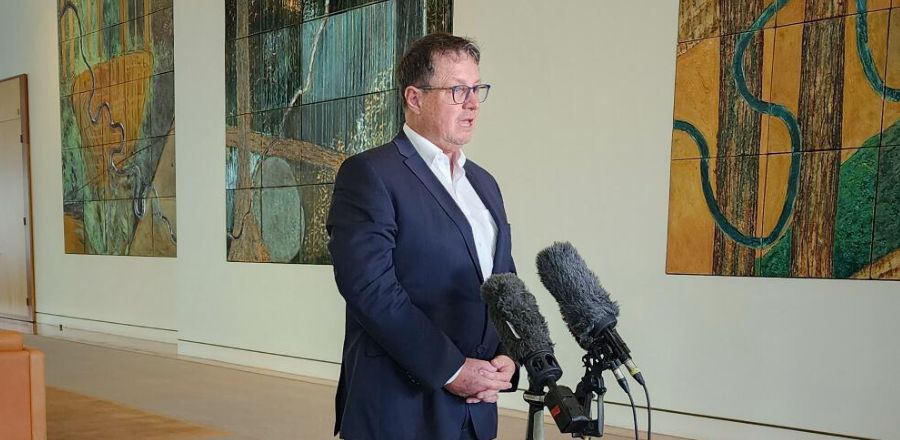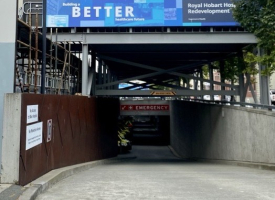AMA President Professor Steve Robson launches 16th Annual Public Hospitals Report Card
Transcript: AMA President, Professor Stephen Robson, Launch of Public Hospital Report Card, Mural Hall Parliament House, Friday, 28 April 2023
Subject: AMA 2023 Public Hospitals Report Card

STEVE ROBSON: I'm Steve Robson, Federal President of the Australian Medical Association. I'm here today to launch our 16th annual public hospital report card. I'm the eighth AMA President to do that and I'm the eighth AMA President to stand here and say things are getting worse. We know that around the country our public hospitals have been under pressure. It makes it difficult for people to see a public hospital specialist. It makes it difficult for Australians to get their care in emergency departments and it leads to long and unacceptable waits to have a planned surgical operation done. We're seeing it around the country. COVID has made things worse, but these were long standing pressures that Australians have been experiencing when they're trying to get care in public hospitals. Later today, our political leaders are meeting in Brisbane through National Cabinet. We hope and we understand that they will seize the opportunity to look at information like this and bring about real reform. We've been looking at the information to inform their decision making. We've released reports about ambulance ramping, about waiting to see hospital specialists, about elective surgery, about all of these things that are important to Australians. So the time now is for action. Happy to take any questions.
QUESTION: What are the main concerns you have at the moment?
STEVE ROBSON: If we look around the country, I think Australians will share our concerns around access and waits in emergency departments; about being able to have a planned operation with hundreds of thousands of Australians now on waiting lists for surgery; and even things like bed block where patients who don't need to be in hospital are occupying public hospital beds because there's nowhere for them to go in aged care or areas like NDIS. There are multiple areas. But the principal thing, the most important thing of all, is keeping people out of hospitals in the first place. So reform through primary care that will ease the pressure must be a high priority.
QUESTION: What are the key things that you want to see come out of today's National Cabinet in terms of health reform?
STEVE ROBSON: So the first thing is we need acknowledgement from our leaders and a commitment to reform in the way public hospitals are funded and run. We have nurses, doctors, health care workers in our public hospitals around the country who are desperate to provide care. They need resourcing and they need support to do that. National Cabinet today is the ideal opportunity to look at funding models and also to look at keeping patients out of hospitals by improving access to general practice and primary care.
QUESTION: So the funding model for hospitals is under review at the moment, but are you hoping for even more immediate action and what does that look like?
STEVE ROBSON: Yeah. So at the moment the National Hospital Reform Agreement is at its halfway point and there's a halfway point review going on. We think it's going to clearly point to the need for major reforms. The funding arrangements as they stand are failing Australians and I think the Premiers and Chief Ministers understand that. We need to look at embedding long term reform in the way hospitals are funded and run that incentivises quality, that incentivises keeping people out of hospital. These have got to be the principals, not just giving money for what they do.
QUESTION: So the Prime Minister has said that they're going to be improving access to after-hours doctors. Is that just extending the current system or is there actually anything new in that announcement?
STEVE ROBSON: We know that the way Australians live and for many vulnerable Australians, being able to see a GP out of hours is critically important. It's restricted and not financially incentivised for practices at the moment and we really hope there'll be significant reform. We think out-of-hours access for a lot of patients will ease pressures on emergency departments around the country. So we're really looking for reform in that space.
QUESTION: Sorry, on that out-of-hours. So it sounds like the funding will come through primary health networks. It'll be an application based scheme for GPs to opt in and extend their hours or employ more staff out of hours. Is that going far enough in terms of the structural reform needed in that space?
STEVE ROBSON: Yeah. Look, it's really important that these issues have been acknowledged and getting the ball rolling on this is critical. So we welcome projects that are going to help the people who most commonly go to emergency departments be able to set up and work with people with primary care and general practices around the country. So these are great first steps and we really welcome them and we hope that it will lead to long term reform for out-of-hours care.
QUESTION: Can you just explain what's the current situation in after-hours access and funding? Is that changing as a result of what's being proposed here?
STEVE ROBSON: Yes. So at the moment there are some funding mechanisms in place. We're hoping that the way out-of-hours care through general practices is reformed, incentivising care for the patients who need it most, and making sure that vulnerable groups like people from non-English speaking backgrounds for example, have access to out-of-hours care. This is likely to take a lot of pressure off emergency departments in a situation where a lot of general practices just work normal hours. We really strongly encourage extension of out-of-hours funding.
QUESTION: And the Government's been pretty clear on its intention to expand pharmacy powers when it comes to vaccinations at least, and we're expecting to hear that today, but also other areas. Will you accept that as a measure that will take some pressure off GPs and free up GPs to treat patients [indistinct]?
STEVE ROBSON: So the Strengthening Medicare Taskforce was very clear that there's absolutely a role for pharmacists in providing care as part of a multidisciplinary team. We're really hoping to see funding reform that allows pharmacists to work with GPs as part of a multidisciplinary team to provide care. We think that's a great model.
QUESTION: How- I guess, then, what level of structure do you want around those multi-disciplinary teams? If it's just something like extending the current mechanism where pharmacists can vaccinate in their pharmacies, what's your response to that going to be?
STEVE ROBSON: So we think there's very good evidence that building a team based around a general practitioner or general practice provide great care, and it extends beyond just pharmacists. It may be diabetic nurses, other nurse practitioners, all working for the good of the patient. And we think there's plenty of scope to integrate the way pharmacists work into those general practice networks for the most vulnerable patients and we really encourage that.
QUESTION: So is that under one roof that you're proposing or is it, you know, just the GPs talking to pharmacists more often?
STEVE ROBSON: So in many cases we know that these teams can form around practices. But at the very least, funding and making sure that everybody's on the same page, everybody's on the same team working towards patient care. We think pharmacists have a big role in working in these kind of teams of GPs. In fact, we think it's critical.
QUESTION: Can you talk a little bit about the gap between metropolitan and regional and rural public hospitals, especially when it comes to after-hours care?
STEVE ROBSON: Yeah, we know that regional, rural and remote hospitals in Australia are under immense pressure. They're under pressures around staffing, making sure that they have adequate nursing and other staff and doctors in these areas have to be very general. They are not like large metropolitan hospitals where people can super specialise. We need the doctors in rural and regional Australia to be generalists. It's really critical.
So making sure that we support generalism, that we provide the resources and staffing that are needed by these hospitals. And a great example is in maternity care. We're seeing around the country pressures on maternity care. These services are about making sure people are general, that midwives can also work in other nursing roles, that doctors when they're not delivering babies, can do other things. So generalism is critically important. And I think a lot of rural and regional areas understand that.
QUESTION: Steve, just back in the pharmacy point, you've also been- as I note, I get your point about the multi-disciplinary teams, but the AMA has been very vocal about their concerns on this proposal. You've said it threatens patient safety. You've said that governments are letting the public down. Is that still what you believe?
STEVE ROBSON: Yeah. We think that whenever there's siloing of medical care, it's a major problem. We know that when people work as a team, they're all on the same page and they're working for the good of vulnerable patients. We get the best outcomes. So we're really against siloing of any sort of care, and we're all about building teams that work together and putting the patient at the heart of what they're trying to do.
QUESTION: So are you expecting to see something on the team-based structure today?
STEVE ROBSON: Yeah. We think it's recognised by state, territory and health ministers, by the premiers in particular that getting the most vulnerable people as part of a GP-led team-based thing is really important. We know the evidence supports that as a way to get great health outcomes. So we're really hoping today that the Prime Minister and the Health Minister through the National Cabinet will be able to deliver measures that make team based care, really bake in team-based care in general practice. And we think if that can be funded and encouraged, we're going to move a long way forward.
QUESTION: So do you maintain your view that governments are failing Australians as per the AMA campaign, or is that changed?
STEVE ROBSON: So I think we know that for a long time a lot of Medicare and public hospital reform has essentially been a can that's been kicked down the road. I think when we look at the report today and we look at the information we see about the state of the public hospital system, it absolutely cries out that the time is now. We just can't kick this can down the road anymore. And we want to see out of the National Cabinet meeting today some serious commitment to big reform that Australians have been crying out for.
QUESTION: A lot has been made of the fact that there's just not enough GPs. That's a long term prospect to fix. What do you expect to see in that front?
STEVE ROBSON: Yeah. The Health Minister Mark Butler himself said the most frightening thing he can see in the health system is that very few recently graduated doctors want to go into general practice. We know general practice is the linchpin and it's actually the most efficient part of the health care system. So we need to do everything we can to promote that, to make it a valuable and viable career option for recently graduated doctors moving forward, and anything we can see that promotes that we really welcome.
QUESTION: Is a large part of that the rebate, Medicare rebates, that have been changed?
STEVE ROBSON: Yeah, we know that successive governments have allowed the rebate either to be frozen for years or indexed at a snail's pace. This has made it financially unviable for so many practices when we look at the inflation rate and the costs you need to run a practice. So we're really looking for reform around this, increased funding for general practice. And making sure that the rebates patients get- we've got to remember the MBS isn't a doctor's salary. It's a rebate that's given to patients, or if doctors want to accept it as a bulk-billing rate, as a way of funding care, affordable care for patients who need it. And we need to make sure that we don't reach a situation where it costs more to provide the care than either the patient can afford or a general practice can get from the MBS.
QUESTION: Thank you.
STEVE ROBSON: Cheers.


